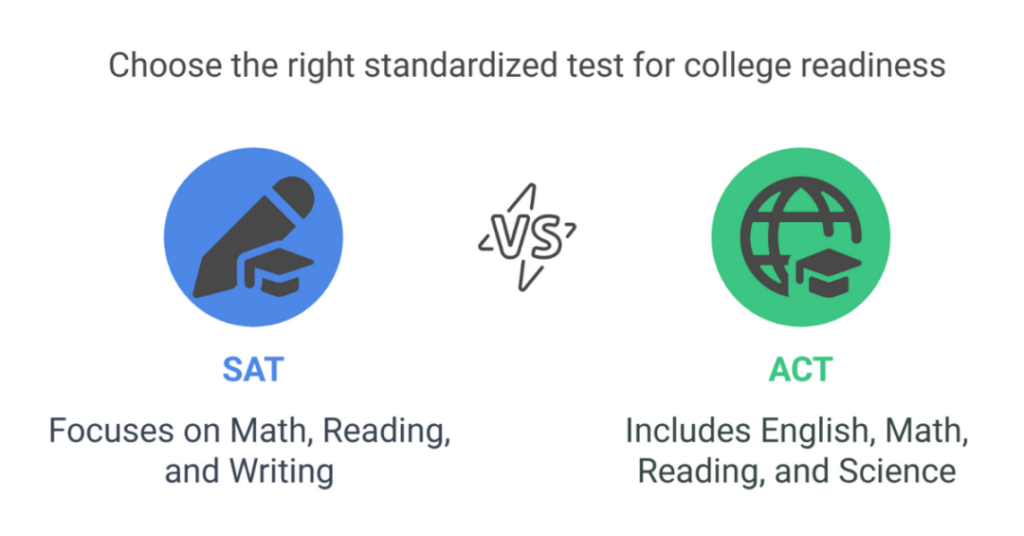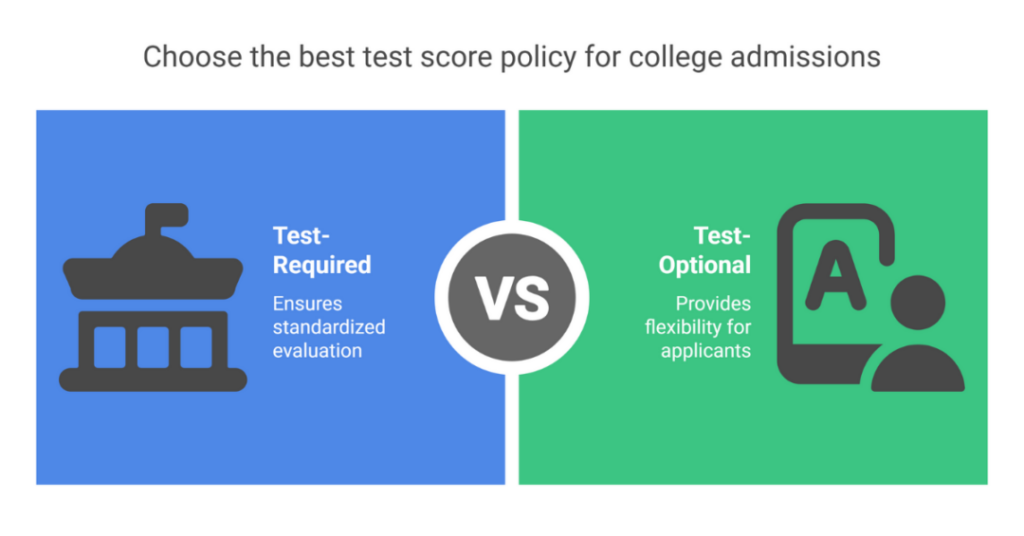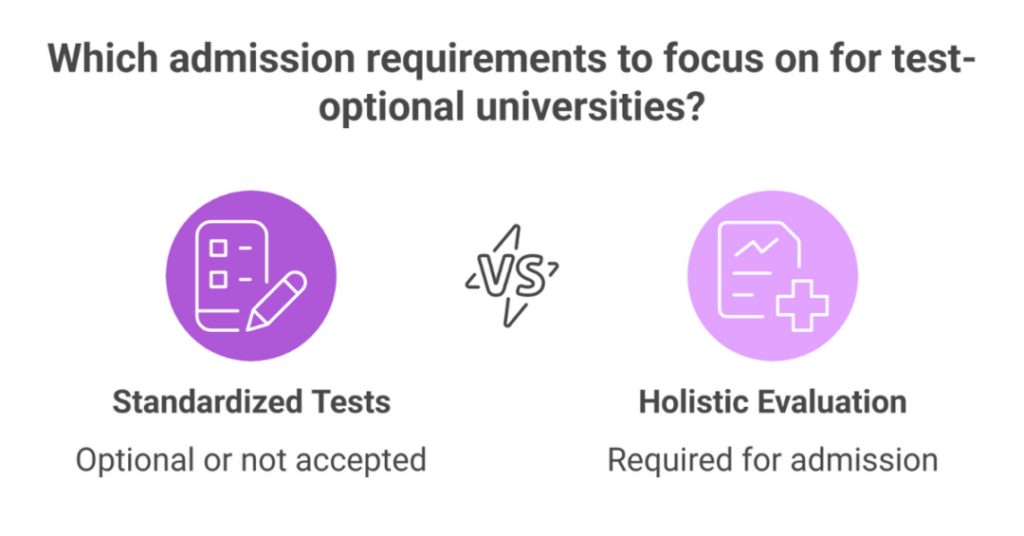14 June 2025
6 minutes read
What are the 10 Best No SAT Universities in USA for Indian Students?

Key Takeaways
- No SAT universities in USA allow Indian students to apply based on holistic profiles, focusing on essays, extracurriculars, and academics instead of standardized testing.
- No SAT universities in USA offer flexible admission policies that welcome applications without requiring SAT or ACT scores from 2023 to 2025.
- No SAT universities in USA include top liberal arts colleges and research universities that prioritize talent beyond test scores.
Entering one of the best universities to study in USA without the SAT or ACT would be like a dream, but it’s highly possible now.
With a change in the admission policy and an increase in test-optional policies, numerous universities and colleges have provided opportunities to international students who either do not or are unable to take tests.
From liberal arts institutions to research universities, the list of colleges not requiring SAT and ACT scores has grown immensely between 2023 to 2025.
For Indian students, in particular, this has revolutionized the scenario, where their personal statement, cocurricular activities, letter of recommendation, resume, and academic achievements become the focus.
This piece deconstructs what test-optional colleges are, why they exist, how they influence college admissions, and most crucially, provides a detailed list of the best US universities that do not require standardized tests in admission.
What is SAT Exam and ACT Exam?
Did you know? The SAT was first administered in 1926, and the ACT in 1959. Fast forward to 2025, and hundreds of colleges in the US no longer require these scores to apply!

The SAT and ACT are standardized exams designed to assess a student’s readiness for college. But what do they actually entail? Here’s a breakdown:
- SAT (Scholastic Assessment Test): Administered by the College Board, it evaluates a student’s proficiency in Math, Evidence-Based Reading, and Writing. Optional essay section discontinued in 2021.
- ACT (American College Testing): Administered by ACT, it includes sections in English, Math, Reading, and Science, with an optional Writing test.
- Purpose: Colleges use these grades for admission consideration, alongside GPA, personal essays, and more.
- Test Frequency: Both exams are offered multiple times a year and require registration.
- Acceptance: Almost all colleges in the US accept either SAT or ACT scores for admissions.
SAT vs ACT: Detailed Comparison:
| Feature | SAT | ACT |
|---|---|---|
| Administered by | College Board | ACT, Inc. |
| Sections | Math, Reading, Writing | English, Math, Reading, Science |
| Optional Essay | No (discontinued) | Yes (optional) |
| Duration | 2 hrs 14 mins | 2 hrs 55 mins (+ 40 mins for Writing) |
| Scoring Scale | 400-1600 | 1-36 |
| Math Tools | Some no-calculator sections | Calculator allowed on all math |
| Popularity | Preferred on East/West Coasts | Popular in Central/Western US |
| Test Format | Digital (from 2023) | Paper-based (as of 2025) |
These scores used to be crucial, but now many universities believe that a student is more than just a test result.
What is the Significance of SAT Score for College Admission?
Here’s a quirky one: A student once scored in the 99th percentile on the SAT and still got rejected from 5 of the top 10 schools. Why? Because test scores are only one part of the college application.
SAT scores once held significant weight in college admissions. But today, things are evolving:
- Holistic Review: Many colleges use a comprehensive review process. Your SAT or ACT score may be considered, but it’s just one piece of the puzzle.
- Scores Reflect Academic Strength: A strong SAT or ACT score can bolster your application if your GPA is average.
- Selective Colleges Still Prefer Them: Some top arts colleges and research universities still require SAT or ACT.
- Scholarship Opportunities: Certain merit scholarships still depend on strong SAT or ACT scores.
- Contextual Consideration: If you’re applying from a school with limited resources, not having a high SAT score might be contextualized.
Your extracurricular activities, resume, and statement of purpose might weigh more than you think!
Do You Require Standardized Test Scores for University Admission?
Fun fact: In 2022, over 1,800 colleges in the US announced test-optional policies. That number has only grown since then!

Here’s a breakdown of the test score requirement policies:
- Test-Required: Students must submit SAT, IELTS, TOEFL, GRE, GMAT or ACT scores to be considered for admission.
- Test-Optional: Students may choose to submit test scores; they are not required.
- Test-Blind: Even if scores are submitted, they will not be considered in the admission process.
- Test-Flexible: Students can submit SAT/ACT or other standardized test scores like AP, IB, or Subject Tests.
- Conditional Test Policy: Scores required only for certain applicants, such as those with low GPAs.
Score Requirement Policy Table:
| University Type | Submit Test Scores? | SAT or ACT Required? | Notes |
| Test-Required | Yes | Yes | Applies to all applicants |
| Test-Optional | Optional | No | Encouraged but not mandatory |
| Test-Blind | No | No | Will not consider test scores |
| Test-Flexible | Optional | No | Other scores can substitute |
| Conditional | Depends | Sometimes | Based on GPA or program |
Whether or not you need to submit scores depends on where you apply and how strong the rest of your application is.
What are SAT Test-Optional Colleges and Universities in USA?
Here’s a zinger: Some schools that are ranked in the top 20 don’t require SAT or ACT scores at all!
Test-optional colleges let applicants choose whether to submit SAT or ACT scores. They recognize that standardized testing may not always reflect a student’s true ability.
- Flexibility for Applicants: Students can apply without the pressure of preparing for SAT or ACT.
- Holistic Admissions: Emphasis on GPA, recommendation letters, personal statement, and extracurriculars.
- COVID-19 Effect: The pandemic accelerated test-optional trends in 2023 to 2025.
- Equal Opportunity: Reduces bias for students from under-resourced backgrounds.
- Still Competitive: Even without SAT scores, admissions are competitive and consider the rest of your application.
Many colleges that are test-optional still welcome scores, but your application will not be penalized without them.
Top 10 Universities That Do Not Require SAT or ACT Score for Admission
Believe it or not, the University of Chicago was one of the first top-tier research universities to go test-optional back in 2018. Others soon followed!
1. University of Chicago
The University of Chicago leads the pack with its forward-thinking admission policies.
- No SAT or ACT required
- Accepts IELTS, TOEFL, and Duolingo
- Requires personal statement and 2 letters of recommendation
- Resume encouraged but not mandatory
- Optional submission of standardized test scores
2. Bowdoin College
Bowdoin College is a pioneer among liberal arts colleges in being test-optional.
- Test-optional since 1969
- Requires statement of purpose
- High school transcript and counselor recommendation
- No SAT subject test scores needed
- Optional resume
3. Smith College
Smith College empowers women through a flexible and inclusive admission process.
- Doesn’t require SAT or ACT
- Requires strong academic transcripts
- Emphasis on extracurricular activities
- Needs personal essay and 2 LORs
- Accepts TOEFL, IELTS
4. Wake Forest University
Wake Forest University is a research university that values holistic applications.
- Does not require students to submit their SAT or ACT
- Statement of purpose and resume essential
- Interviews recommended
- Accepts IELTS and TOEFL
- SAT scores may be submitted voluntarily
5. Pitzer College
Part of the Claremont Colleges, Pitzer values student voice.
- Fully test-optional
- Requires letters of recommendation and transcripts
- No need to submit scores unless desired
- Encourages creative portfolios
- Accepts TOEFL/IELTS

6. George Washington University
Located in Washington D.C., the George Washington University dropped SAT/ACT requirements years ago.
- Students to submit SAT only if they want
- Requires high school GPA and recommendation letters
- Strong focus on resume and personal achievements
- Accepts IELTS and TOEFL
- Optional writing sample
7. Hampshire College
A truly test-blind college in Massachusetts.
- Will not accept SAT or ACT scores at all
- Emphasizes written evaluations and portfolios
- Requires letters of recommendation
- Focuses on intellectual curiosity
- Accepts IELTS/TOEFL
8. Colorado College
Blends academic excellence with test-optional freedom.
- SAT and ACT scores are not required
- Accepts GRE/GMAT for graduate programs
- Requires personal essay, transcript
- TOEFL/IELTS mandatory for international applicants
- Offers optional video interview
9. Sarah Lawrence College
A creative arts-focused liberal arts college in New York.
- Doesn’t require test scores
- Accepts AP/IB scores as optional supplements
- Strong emphasis on SOP and LORs
- Requires high school transcript
- Accepts IELTS/TOEFL
10. Reed College
Encourages individuality and intellectual exploration.
- SAT and ACT completely optional
- Requires a detailed resume
- Statement of purpose and two LORs
- TOEFL/IELTS accepted
- SAT scores would be considered if sent
Conclusion
College admissions have come a long way. From SAT or ACT requirements to test-optional and test-blind approaches, most universities across the US are learning that standardized testing is not the only way to discover talent.
The number of colleges and universities that don’t ask for SAT or ACT scores is on the rise, opening new doors for international students. Between 2023 and 2025, policies have relaxed, shifting the focus once again to who you are outside of numbers.
That means your personal statement, letter of recommendation, resume, extracurricular activities, and academic rigor count more than ever.
As you explore colleges that don’t require SAT or ACT, remember to check out the full list on official university sites. Each school’s admission process is unique, and test scores may still be required for specific programs or scholarships. But the good news?
You now have the freedom to choose. Whether you’re sending test scores or applying without SAT, what truly counts is the rest of your application. So go ahead, apply smart, and let your story shine.
Colleges that are test-optional aren’t lowering the bar – they’re changing the way they measure brilliance.
Let’s navigate this world of admissions that do not require the SAT with Ambitio, your trusted abroad study partner!
FAQs
What are no SAT universities in USA?
No SAT universities in USA are institutions that do not require SAT scores for admission. These no SAT universities in USA evaluate applicants based on other academic and personal criteria.
Are no SAT universities in USA recognized and ranked globally?
Yes, no SAT universities in USA like the University of Chicago are globally respected and highly ranked. Many no SAT universities in USA feature in top positions across US News and global rankings.
Can Indian students apply to no SAT universities in USA without any test scores?
Yes, Indian students can apply to no SAT universities in USA using only their academic records, personal statements, and other documents, without submitting SAT or ACT scores.
Do no SAT universities in USA offer scholarships to international students?
Many no SAT universities in USA provide need-based and merit-based scholarships, though some scholarships may still require additional documentation or test scores.
Is the admission process easier at no SAT universities in USA?
The admission process at no SAT universities in USA is not necessarily easier but focuses more on a student’s overall profile rather than standardized test performance.
How can I find a reliable list of no SAT universities in USA?
You can find updated and official lists of no SAT universities in USA on college websites, educational forums, or trusted study abroad consultant platforms.
Do no SAT universities in USA accept TOEFL or IELTS for English proficiency?
Yes, most no SAT universities in USA require TOEFL or IELTS scores to evaluate English language proficiency, especially for international applicants.

You can study at top universities worldwide!
Get expert tips and tricks to get into top universities with a free expert session.
Book Your Free 30-Minute Session Now! Book a call now




























